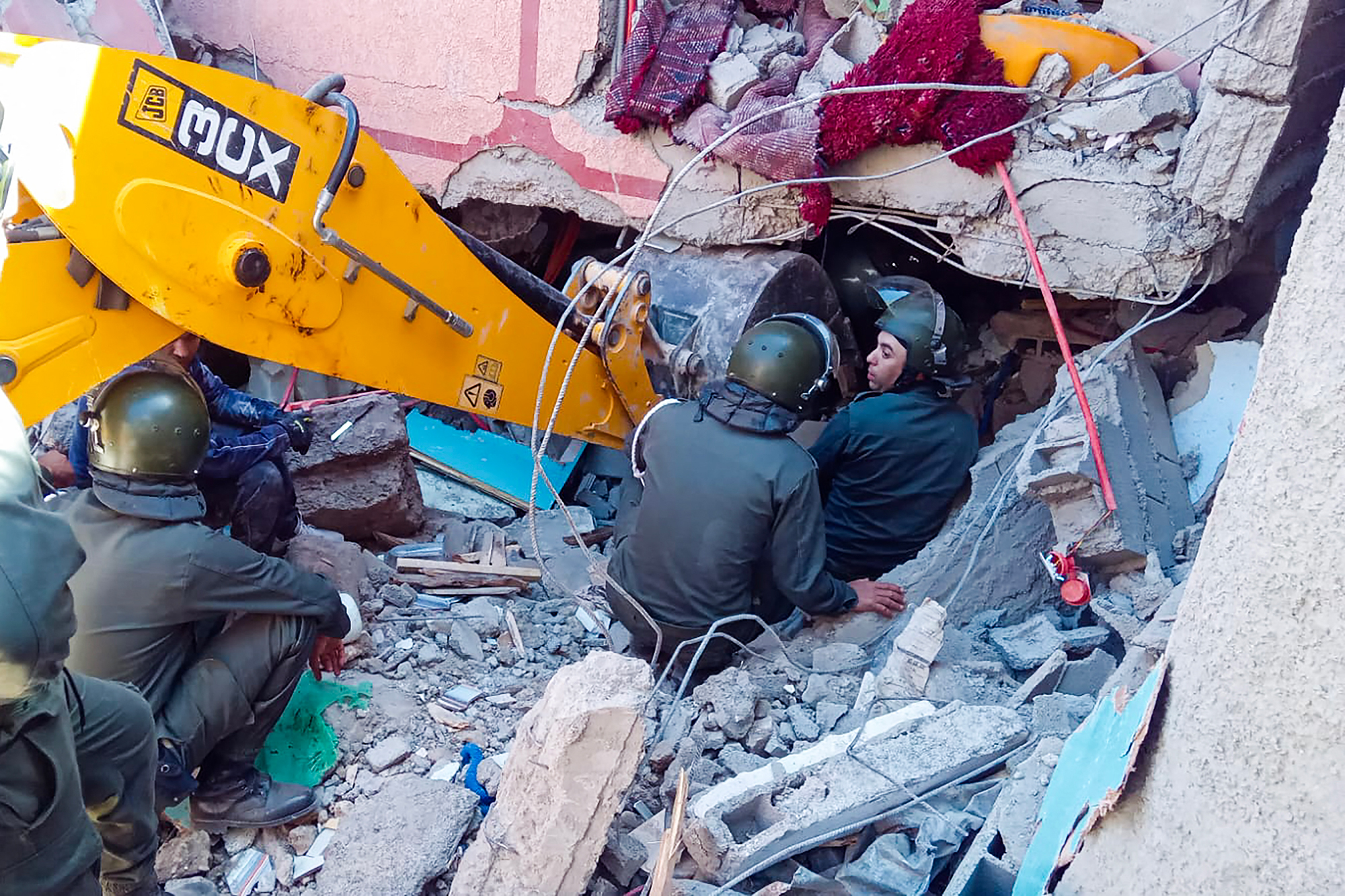Not too late to help Morocco earthquake survivors
The 6.8 magnitude earthquake that struck Morocco, on September 8, 2023, has left the country with the kind of devastation that will be evergreen in the memory of survivors throughout their lifetime. According to an American Geological Survey, the quake was recorded at a depth of 18.5 km, and it was said to have been […]

Rescue workers search for survivors in a collapsed house in Moulay Brahim, Al Haouz province, on September 9, 2023, after an earthquake. Morocco’s deadliest earthquake in decades has killed at least 820 people, officials said on September 9, causing widespread damage and sending terrified residents and tourists scrambling to safety in the middle of the night. (Photo by Fadel SENNA / AFP) (Photo by FADEL SENNA/AFP via Getty Images)
Rescue workers search for survivors in a collapsed house in Al Haouz, Morocco, on September 9. Fadel Senna/AFP/Getty Images
The 6.8 magnitude earthquake that struck Morocco, on September 8, 2023, has left the country with the kind of devastation that will be evergreen in the memory of survivors throughout their lifetime. According to an American Geological Survey, the quake was recorded at a depth of 18.5 km, and it was said to have been more destructive than deeper quakes of the same magnitude. The catastrophe was Morocco’s deadliest earthquake since 1960, when an earthquake was estimated to have killed at least 12,000 people. The deaths recorded in this month’s earthquake are about 3,000, among them children. Some villages have been levelled by half; social infrastructure has been damaged beyond repair; many hospitals in the areas where the earthquake struck are no longer safe for patients to be treated; and the shortage of food, medicine, water, shelter, and other things that are essential for human survival is acute.
The hardest hit part of Morocco is the south of Marrakesh, where many villages that have existed in and around mountains have been completely destroyed. A school teacher in one of the villages lamented the deaths of all 32 of the pupils in her Arabic and French class. The children were said to be between the ages of six and 12. A British Broadcasting Corporation (BBC) journalist quoted her as saying: “I imagined holding my class’s attendance sheet and putting a line through one student’s name after another, until I had scratched off 32 names; they are all now dead.” In the same area, half the population of some villages was killed, with some recording as many as 200 deaths in small villages. Perhaps, the level of destruction in the earthquake is captured aptly by another schoolteacher, Abdelali, who told the BBC that “We need a new word that is even stronger than horrific, than horrible, than disastrous, than catastrophic. Violent is not a good description, terrifying does not describe the situation.”
The people are in grief in its rawest form, as some slump and faint at the hopelessness they harvested as they searched for their loved ones. For lack of tools, villagers reportedly used their bare hands and shovels to dig through rubble in search of survivors. On many occasions, they were unlucky to find survivors in ruined houses and other buildings; the same tools were used to dig graves for burying the dead. The misery facing the people is captured in general starvation, and the spectacle of children in need of scarce water. The fallout of the earthquake is horrifying. Official figures put the number of educational institutions damaged at about 530, many of which have been totally destroyed or suffered severe structural damage.
More than a week after the earthquake, ReliefWeb, an international relief organisation, told the world in its situation report that Morocco needed urgent assistance. It said, “The number of casualties continue to rise following the devastating quake that struck Al Haouz Province on September 8. National authorities have reported a grim tally, with 2,946 lives tragically lost and a staggering 5,674 individuals left injured in the wake of this natural disaster. The primary reported needs are food, water, psychosocial support, and shelter. Due to the extensive damage caused by the earthquake, many people have been displaced from their homes and are seeking refuge in public facilities, often resorting to sleeping outdoors.”
‘Attacks on Nigerian journalists increasing’
NBA star, Onyeka set to dump Nigeria for Philippines
The United Nations International Children’s Emergency Fund (UNICEF) has also made an appeal for donations from across the globe. It said, “In an emergency, children are always among the most vulnerable. Families have lost their homes and are in urgent need of shelter, safe water and medical care. Our team in Morocco is mobilised and ready to support children and their families. Help us reach children affected by disasters like the Morocco earthquake. We are appealing for donations to our Children’s Emergency Fund. This is a vital resource for children in emergencies, just like the Morocco earthquake. With funds ready to go, we can reach the most affected children and families fast.”
We join other citizens of the world to sympathise with the people of Morocco over this devastating incident. Survivors of the earthquake need urgent help and it is not too late for the government of Nigeria, foundations and individuals to contribute to efforts to cushion the effects of the earthquake on the people. In the name of our common humanity, we encourage Nigerians to support survivors of the earthquake in whatever way they can. The challenge of helping Moroccans in this hour of need should not be left to Western countries and multilateral organisations alone. A developing country, like Nigeria, can and should offer help. And it is not too late to do so.
